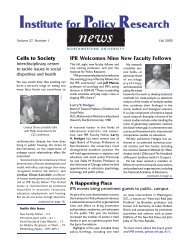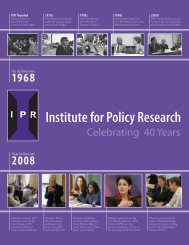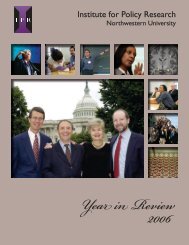Highlights of 2011 - Institute for Policy Research - Northwestern ...
Highlights of 2011 - Institute for Policy Research - Northwestern ...
Highlights of 2011 - Institute for Policy Research - Northwestern ...
Create successful ePaper yourself
Turn your PDF publications into a flip-book with our unique Google optimized e-Paper software.
Urban <strong>Policy</strong> and Community Development<br />
From left: IPR political scientist Wesley G. Skogan, sociolegal scholar and IPR associate John Hagan, and University <strong>of</strong> Chicago<br />
economist Jens Ludwig discuss recent changes to the criminal justice system with Chicago Police Lieutenant Mike Dejanovich.<br />
RESEARCH TOPICS:<br />
• Urban poverty concentration<br />
• Cross-national urban issues<br />
• Race and income segregation<br />
• Community policing and criminal justice<br />
• Public and mixed-income housing<br />
21st Century Justice<br />
Three <strong>of</strong> the nation’s leading researchers on crime and criminal<br />
justice discussed some major changes in the American criminal<br />
justice system and policy implications at a March 28 IPR <strong>for</strong>um<br />
at <strong>Northwestern</strong> University. IPR political scientist Wesley G.<br />
Skogan took stock <strong>of</strong> policing re<strong>for</strong>ms. Though enthusiastically<br />
brought <strong>for</strong>ward, re<strong>for</strong>ms and innovations <strong>of</strong>ten fail due to<br />
factors such as rapid leadership turnover and poor inter-agency<br />
cooperation. Looking ahead, Skogan pointed to technological<br />
innovations—such as in-car cameras and data warehouses.<br />
IPR associate John Hagan, John D. MacArthur Pr<strong>of</strong>essor <strong>of</strong><br />
Sociology and Law, discussed changes in prison funding in<br />
Cali<strong>for</strong>nia. Since 1992, prisons are no longer built with pay-asyou-go<br />
funding, but with lease-revenue bonds, which do not<br />
require voter approval, create public debt, and generate fees <strong>for</strong><br />
the institutions servicing the debt—helping to create economic<br />
incentives to build more. Discussing the enormous difficulties<br />
<strong>of</strong> trying to change gun regulations, University <strong>of</strong> Chicago<br />
economist Jens Ludwig recommended focusing on stepped-up<br />
en<strong>for</strong>cement by reducing young people’s access to and use <strong>of</strong><br />
guns, targeting illegal gun-carrying, and cracking down on gunsupply<br />
networks to prevent criminals from obtaining them.<br />
Segregation and Contextual Advantage<br />
At the <strong>2011</strong> annual meeting <strong>of</strong> the Population Association <strong>of</strong><br />
America, IPR sociologist Lincoln Quillian discussed his work<br />
to provide a <strong>for</strong>mal demographic model <strong>of</strong> how segregation<br />
contributes to inequality through increasing the level <strong>of</strong><br />
contextual advantage experienced by members <strong>of</strong> advantaged<br />
segregated groups and the level <strong>of</strong> contextual disadvantage <strong>of</strong><br />
disadvantaged segregated groups. His model begins with two<br />
groups that differ along a dimension <strong>of</strong> average advantage<br />
and disadvantage, such as two racial groups that differ in<br />
their poverty rates. The model employs standard measures<br />
<strong>of</strong> segregation and contact, and illustrates how the contextual<br />
advantages and disadvantages from segregation are affected<br />
by the size <strong>of</strong> the group and the rates <strong>of</strong> group advantage (or<br />
disadvantage). It also considers complexities that occur when<br />
the characteristics that define advantages or disadvantages,<br />
such as income or poverty, have independent effects. The<br />
decomposition can be applied to understand how segregation<br />
contributes to contextual advantage <strong>for</strong> advantaged group<br />
members in a variety <strong>of</strong> situations, including neighborhoods,<br />
schools, and friendship networks.<br />
54 INSTITUTE FOR POLICY RESEARCH

















